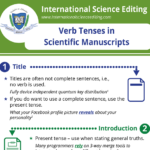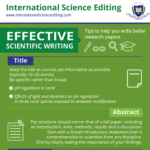This question was asked in the Q&A session of a recent talk on the topic of scientific publishing presented by International Science Editing in China. In this blog, we look more deeply at this question and discuss why there is no simple answer. Non-English sources may be a problem for reviewers Reviewers are generally instructed […]
Tips for writing sentences about science
Make your writing clear Say what you mean For example, the sentence The observed changes in the gut microbiota caused inflammation in the mice. suggests direct causation. However, if this was an observational study, the two outcomes were probably observed to occur together, but direct causation was not demonstrated. If so, the sentence should be […]
Verb tenses in scientific manuscripts (infographic)
A key aspect of producing a well-written scientific manuscript worthy of publication is the use of appropriate verb tenses in the different sections of the manuscript. In this infographic, we discuss when, where, and how to use the different verb tenses. The infographic contains the following text: Title Titles are often not complete sentences, i.e., […]
Effective scientific writing – Tips to help you write better research papers (infographic)
In this infographic, we provide some useful tips to help you write better research papers. The infographic contains the following text: Title Keep the title as concise yet informative as possible (typically 10-20 words). Be specific rather than broad. pH regulation in coral ✘ Effects of light and darkness on pH regulation in three coral […]
How to prevent plagiarism
In this blog, our guest blogger, Professor Emeritus Dolores Takemoto from Kansas State University discusses plagiarism in scientific documents: what it is, what the penalties are (even if unintentional), and how to avoid it. Merriam-Webster’s online dictionary defines plagiarism as “to steal and pass off (the ideas or words of another) as one’s own: use […]





